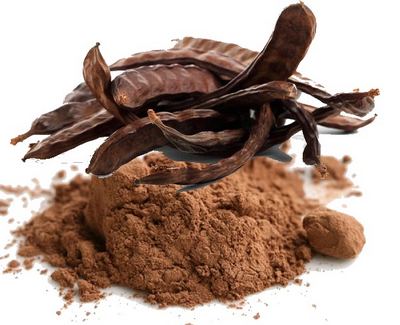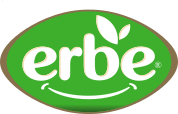CAROB POWDER
Carob is native to the eastern Mediterranean, probably the Middle East, where it has been in cultivation for at least 4000 years. This plant is also called St. John's bread or locust bean because the pods were once thought to have been the "locusts" that were eaten by John the Baptist in the Wilderness.
The dark-brown pods are not only edible, but also rich in sucrose (almost 40% plus other sugars) and protein (up to 8%). Moreover, the pod has vitamin A, B vitamins, and several important minerals. We know carob mostly because the pods are ground into a flour that is a cocoa substitute. Although this product has a slightly different taste than chocolate, it has only one-third the calories (total 1595 calories per pound), is virtually fat-free (chocolate is half fat), is rich in pectin, is nonallergenic, has abundant protein, and has no oxalic acid, which interferes with absorption of calcium. Consequently, Erbe carob flour is widely used in health foods for chocolate-like flavoring. Erbe carob powder has a number of advantages over Cocoa powder and as such is often used to make what has come to be known as 'healthy chocolate' .
Erbe carob powder is free of the allergetic and addictive effects of caffeine and theobromine present in Cocoa. It also contains less fat and more sugar than Cocoa. Cocoa has around 23% fat and 5% sugar while Erbe carob contains apporoximately 7% fat and 42-48% sugar. Erbe carob powder is often used as a substitute for cocoa at rates of up to 50%.
Used in this manner Erbe carob has become a popular chocolate substitute used in a huge variety of confectionery products and drinks as well as a general sweetener. Apart from the health benefits obtained by subsituting Erbe carob for Cocoa and synthetic sweeteners in our diet, Erbe carob also has excellent nutritional value. Along with up to 80% protien, it contains Magnesium, Calcium, Iron, Phosphorus, Potassium Manganese, Barium, Copper, Nickel and the vitamins A, B, B2, B3, and D. It also has medicinal uses including the treatment of coughs and diarrhoea. Erbe carob naturally contains polyphenols, which help with blood cholesterol levels in a way similar to dietary fiber. Dietary fiber helps lower cholesterol levels. A 2010 issue of “Plant Foods for Human Nutrition” reported on a human study that found a 4-gram serving of polyphenol-rich fiber twice a day led to a decreased level of serum lipids; low density lipoproteins, also known as “bad” cholesterol; high density lipoproteins, or “good” cholesterol; and triglycerides after a period of four weeks
Carob is native to the eastern Mediterranean, probably the Middle East, where it has been in cultivation for at least 4000 years. This plant is also called St. John's bread or locust bean because the pods were once thought to have been the "locusts" that were eaten by John the Baptist in the Wilderness.
The dark-brown pods are not only edible, but also rich in sucrose (almost 40% plus other sugars) and protein (up to 8%). Moreover, the pod has vitamin A, B vitamins, and several important minerals. We know carob mostly because the pods are ground into a flour that is a cocoa substitute. Although this product has a slightly different taste than chocolate, it has only one-third the calories (total 1595 calories per pound), is virtually fat-free (chocolate is half fat), is rich in pectin, is nonallergenic, has abundant protein, and has no oxalic acid, which interferes with absorption of calcium. Consequently, Erbe carob flour is widely used in health foods for chocolate-like flavoring. Erbe carob powder has a number of advantages over Cocoa powder and as such is often used to make what has come to be known as 'healthy chocolate' .
Erbe carob powder is free of the allergetic and addictive effects of caffeine and theobromine present in Cocoa. It also contains less fat and more sugar than Cocoa. Cocoa has around 23% fat and 5% sugar while Erbe carob contains apporoximately 7% fat and 42-48% sugar. Erbe carob powder is often used as a substitute for cocoa at rates of up to 50%.
Used in this manner Erbe carob has become a popular chocolate substitute used in a huge variety of confectionery products and drinks as well as a general sweetener. Apart from the health benefits obtained by subsituting Erbe carob for Cocoa and synthetic sweeteners in our diet, Erbe carob also has excellent nutritional value. Along with up to 80% protien, it contains Magnesium, Calcium, Iron, Phosphorus, Potassium Manganese, Barium, Copper, Nickel and the vitamins A, B, B2, B3, and D. It also has medicinal uses including the treatment of coughs and diarrhoea. Erbe carob naturally contains polyphenols, which help with blood cholesterol levels in a way similar to dietary fiber. Dietary fiber helps lower cholesterol levels. A 2010 issue of “Plant Foods for Human Nutrition” reported on a human study that found a 4-gram serving of polyphenol-rich fiber twice a day led to a decreased level of serum lipids; low density lipoproteins, also known as “bad” cholesterol; high density lipoproteins, or “good” cholesterol; and triglycerides after a period of four weeks





